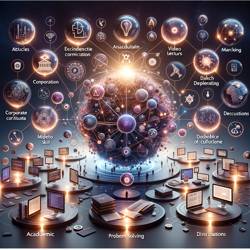Bridging Academic and Workplace Skills
In today's fast-paced world, the divide between academic learning and workplace requirements has become more pronounced. As industries evolve, the demand for specific skills that aren't always covered in traditional academic settings grows. This gap can lead to a mismatch between what students learn and what employers need, making it crucial to bridge these differences effectively.
The Importance of Bridging Academic and Workplace Skills
The transition from academia to the professional world is often fraught with challenges. Many graduates find themselves unprepared for the practical demands of their chosen fields. According to a 2022 survey by the National Association of Colleges and Employers (NACE), only 50% of employers felt that recent graduates were proficient in critical thinking and problem-solving, skills essential in most workplaces.
Bridging this gap is not just beneficial for students; it also holds immense value for employers who seek well-rounded candidates capable of adapting quickly to new roles. Furthermore, enhancing these skills contributes to personal growth, fostering a more versatile workforce that can tackle complex global challenges.
Identifying the Gap Between Academic Curriculum and Workplace Requirements

The root of this gap often lies in the curriculum itself. Academic programs are typically designed with a focus on theoretical knowledge rather than practical application. While understanding theory is essential, its real-world application is where many students falter. For instance, engineering students might excel in understanding complex algorithms but struggle when tasked with implementing them in real-world projects.
A report by the World Economic Forum in 2023 highlighted that over 40% of core skills required across all job sectors will change by 2025. This rapid evolution underscores the need for curricula that are flexible and responsive to industry trends. Institutions must therefore prioritize updating their courses regularly, integrating hands-on experiences that mirror workplace scenarios.
Role of Social Learning Networks in Skill Development
Social learning networks have emerged as powerful tools in bridging this divide. By facilitating interaction among learners, educators, and industry professionals, these platforms offer a dynamic environment for skill development. Function Space is one such network that excels in providing a comprehensive ecosystem where users can engage with articles, video lectures, problem-solving activities, discussions, and networking opportunities.
Through these platforms, learners can gain insights into industry expectations directly from professionals actively working in their fields. This exposure not only enhances their understanding but also allows them to develop soft skills like communication and teamwork—skills that are highly valued by employers.
- Key Features of Social Learning Networks:
- Interactive content delivery
- Peer-to-peer learning opportunities
- Access to industry experts
- Real-time feedback mechanisms
Function Space: A Platform for Enhanced Learning Experiences

Function Space stands out as an innovative platform dedicated to bridging academic and workplace skills through its unique offerings. By integrating LaTeX for precise documentation and markdown formatting for easy content creation, Function Space ensures users have access to high-quality educational resources tailored to scientific disciplines.
With its diagramming tools and responsive interface, learners can visualize complex concepts effectively while engaging with embedded videos that provide deeper insights into subject matter applications. This holistic approach not only enriches the learning experience but also prepares participants for real-world challenges by simulating professional environments within an academic context.
| Feature | Benefit |
|---|---|
| LaTeX Integration | High-quality documentation |
| Markdown Formatting | Easy content creation |
| Diagramming Tools | Effective visualization of concepts |
| Embedded Videos | Deeper insights into subject applications |
Utilizing Technology to Integrate Academic and Practical Skills
Technology plays a pivotal role in merging academic knowledge with practical expertise. Through online platforms like Function Space, learners can access simulations and virtual labs that replicate real-world scenarios. These technologies allow students to experiment without the constraints typically associated with physical resources or geographical limitations.
Moreover, advancements in artificial intelligence (AI) offer personalized learning experiences by adapting content based on individual progress and needs. This adaptability ensures that each learner receives targeted support, helping them overcome specific challenges they may face when applying theoretical knowledge practically.
Networking and Collaboration: Building Connections Between Academia and Industry
Networking is an indispensable component of career development. By building connections between academia and industry, social learning networks like Function Space facilitate collaboration among students, educators, researchers, and professionals across various fields.
Such interactions provide invaluable opportunities for mentorships, internships, or collaborative projects—each serving as a stepping stone towards career success. Engaging with industry professionals enables learners to stay abreast of emerging trends while gaining firsthand insights into potential career paths.
- Benefits of Networking Through Function Space:
- Access to diverse professional networks
- Opportunities for mentorships
- Exposure to real-world projects
- Insight into industry trends
By leveraging these connections effectively within platforms like Function Space's vibrant community setting—where science enthusiasts unite under one roof—students can navigate their transition from academia into thriving careers seamlessly!